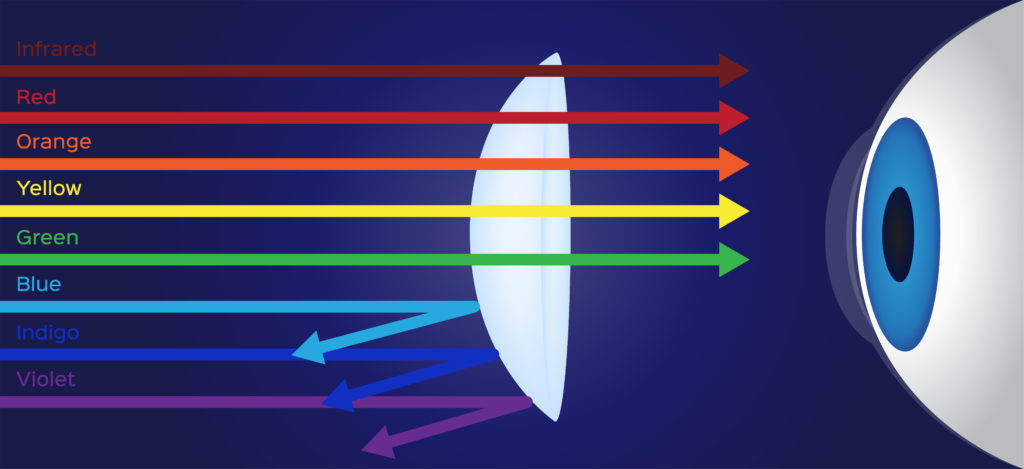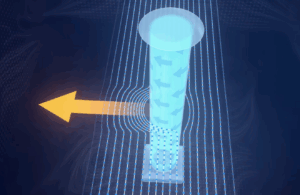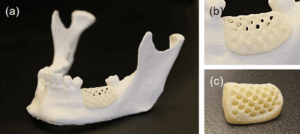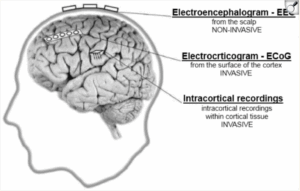Glasses designed to block blue light and prevent symptoms from excessive screen time
As the use of technology in our daily lives continues to spread, many people find themselves staring at a screen for hours. With the current nationwide lockdown due to the coronavirus outbreak, this trend is especially prevalent as schools and non-essential businesses go online; the country is even more dependent on technology than before. Eye strain, headaches, insomnia, and physical and mental fatigue are among the many symptoms of excessive screen time (2). These conditions are allegedly caused by the blue light emitted from electronic devices. Many have turned to glasses with specially crafted lenses that block blue light and reduce the potential damage to the eyes from exposure (3). But are they truly effective?

Blue light glasses have proven to be effective by having blue-light-absorbing filters in their lenses (6). Blue light is the portion of the visible light spectrum with the shortest wavelengths and the highest energy, which is why it is often referred to as high-energy visible (HEV) light (4). The human eye does not block blue light well; it can pass through the cornea and reach the retina, which may cause some discomfort (4). According to the American Academy of Ophthalmology, however, blue light glasses are not necessary to combat the effects of screen exposure (5). “There’s really no evidence that [blue light glasses] help,” said Amir Mohsenin, an assistant professor in the Ruiz Department of Ophthalmology & Visual Science at UTHealth McGovern Medical School (5). Studies have shown that most symptoms from electronic devices are not from blue light, but from how these devices are used (5). When people stare at a digital screen for a long period of time, they’re not blinking as often, which causes the cornea to become dry and irritated (3). In addition, the eyes are constantly focused on something near, which causes them to become strained and contracted, resulting in eye discomfort (3). Instead of blue light glasses, other methods recommended by ophthalmologists proven to be more effective include relaxing the eyes every 20 minutes, eye drops, and sitting farther away from the screen (3).
Other major concerns regarding blue light exposure are its effects on sleep and potentially causing diseases. Until the advent of artificial lighting, the sun was the major source of lighting, and the evenings were usually filled with darkness. Nowadays, the evenings are illuminated with street lights and electronic devices. At night, these artificial lights disrupt the circadian rhythm, the body’s biological clock, which in turn affects the sleep cycle and potentially leads to diseases such as cancer, diabetes, heart disease, and obesity (1). As the sun goes down, the lack of light sends a signal to our bodies to start producing melatonin, a hormone that regulates sleep (6). Exposure to artificial light suppresses the secretion of melatonin, keeping the body alert and focused (2). While any light can block melatonin, blue light at night does so more powerfully, according to researchers at Harvard University and the University of Toronto (1). Therefore, blue light glasses are potentially useful to allow for the normal secretion of melatonin and prevent interference with the circadian rhythm. However, most electronic devices today have a night mode, which limits the emission of blue light without the use of special glasses.
Although blue light glasses do block the eyes from exposure to blue light, they do not prevent the symptoms which come with the excessive use of electronic devices. Instead of spending nearly $100 on a pair of these glasses, utilize other, simpler methods that have proven to be more effective.
– Abby Chen
References
- Harvard Health Publishing. (2012, May). Blue light has a dark side. Retrieved from https://www.health.harvard.edu/staying-healthy/blue-light-has-a-dark-side
- Blutech. (n.d). What is Blue Light? Retrieved from https://blutechlenses.com/blog/what-is-blue-light/
- Cleveland Clinic. (2020, March 18). Do Blue Light Blocking Glasses Actually Work? Retrieved from https://health.clevelandclinic.org/do-blue-light-blocking-glasses-actually-work/
- Do you need blue light glasses? (2019, August). Retrieved from https://www.allaboutvision.com/eyeglasses/blue-light-glasses/
- Galehouse, M., George, C., & Pierce, S. (2020, January 26). Debunking blue light glasses claims to focus on proven eye issues. Retrieved from https://www.tmc.edu/news/2020/01/debunking-blue-light-glasses-claims-to-focus-on-proven-eye-issues/
- Mitroff, S. (2019, September 13). Want to buy blue-light blocking glasses? Read this first. Retrieved from https://www.cnet.com/how-to/what-are-blue-light-blocking-glasses/
Images






Be First to Comment